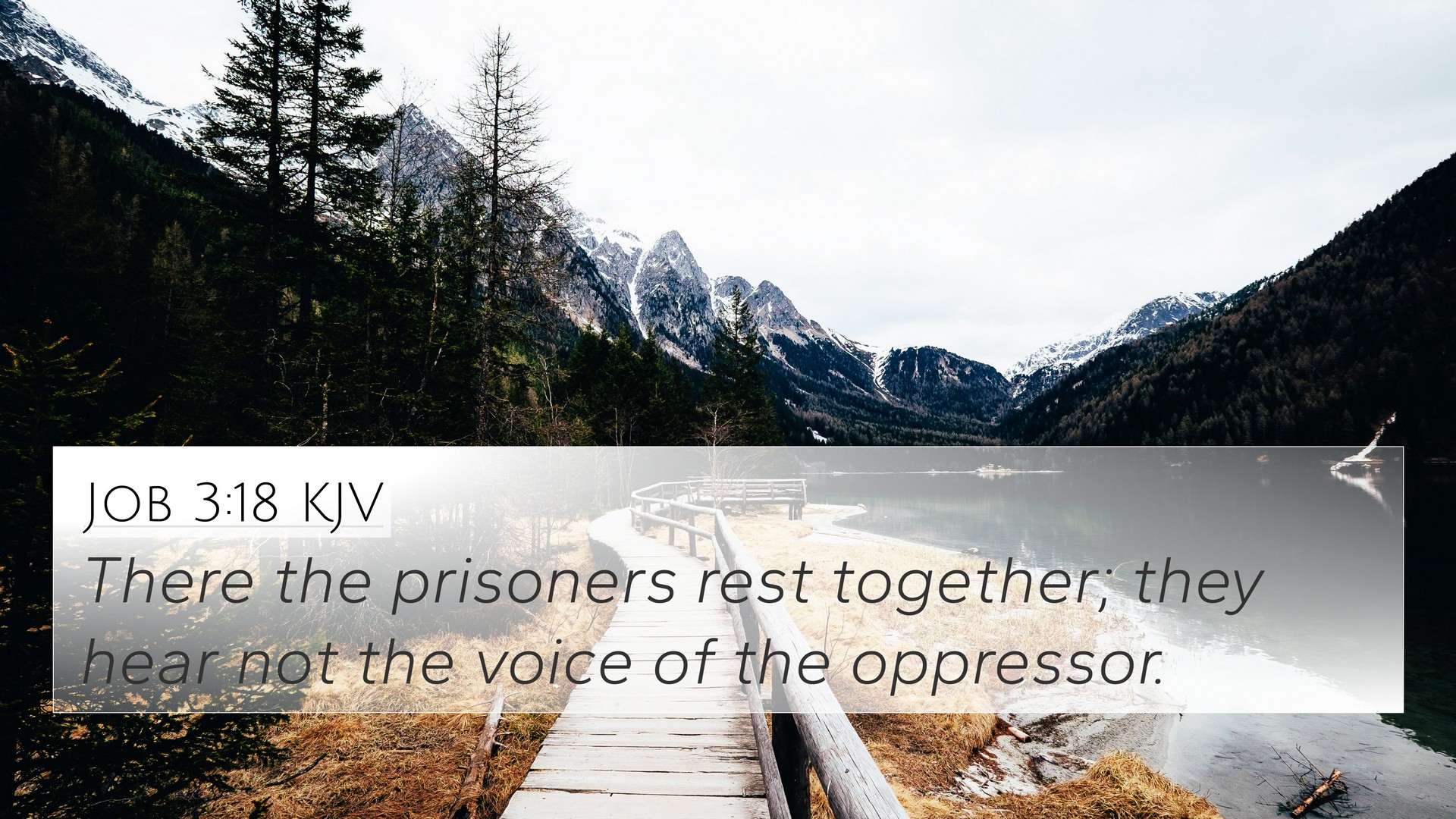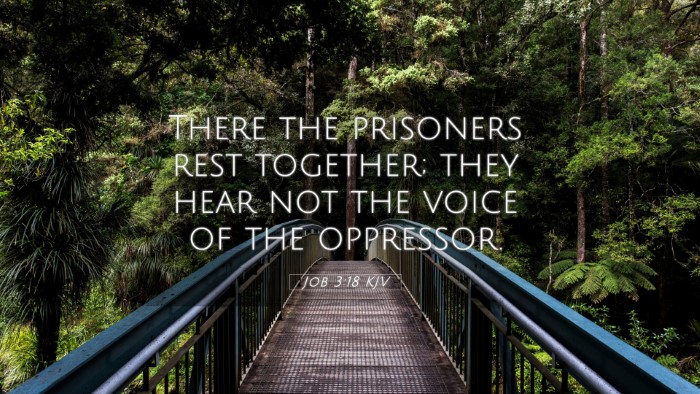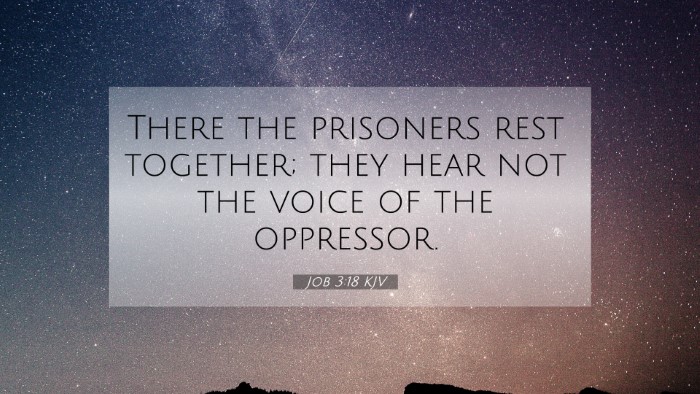Old Testament
Genesis Exodus Leviticus Numbers Deuteronomy Joshua Judges Ruth 1 Samuel 2 Samuel 1 Kings 2 Kings 1 Chronicles 2 Chronicles Ezra Nehemiah Esther Job Psalms Proverbs Ecclesiastes Song of Solomon Isaiah Jeremiah Lamentations Ezekiel Daniel Hosea Joel Amos Obadiah Jonah Micah Nahum Habakkuk Zephaniah Haggai Zechariah MalachiJob 3:18 Similar Verses
Job 3:18 Cross References
There the prisoners rest together; they hear not the voice of the oppressor.
Uncover the Rich Themes and Topics of This Bible Verse
Listed below are the Bible themes associated with Job 3:18. We invite you to explore each theme to gain deeper insights into the Scriptures.
Job 3:18 Cross Reference Verses
This section features a detailed cross-reference designed to enrich your understanding of the Scriptures. Below, you will find carefully selected verses that echo the themes and teachings related to Job 3:18 KJV. Click on any image to explore detailed analyses of related Bible verses and uncover deeper theological insights.
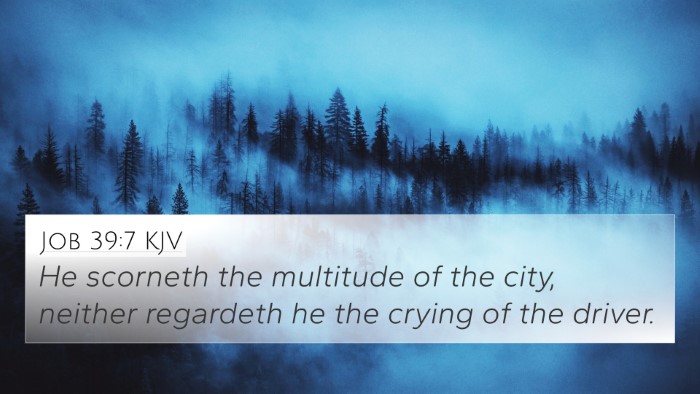
Job 39:7 (KJV) »
He scorneth the multitude of the city, neither regardeth he the crying of the driver.
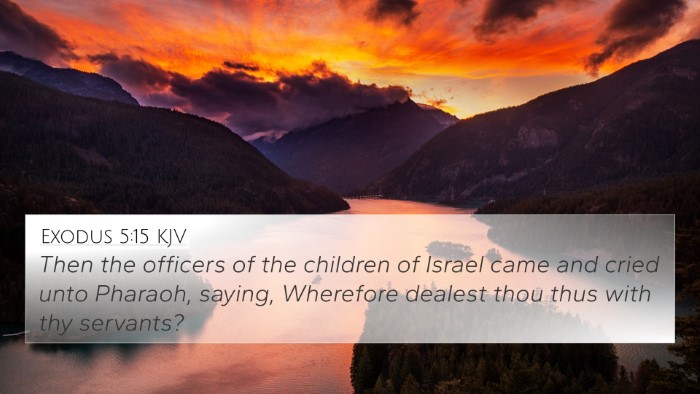
Exodus 5:15 (KJV) »
Then the officers of the children of Israel came and cried unto Pharaoh, saying, Wherefore dealest thou thus with thy servants?
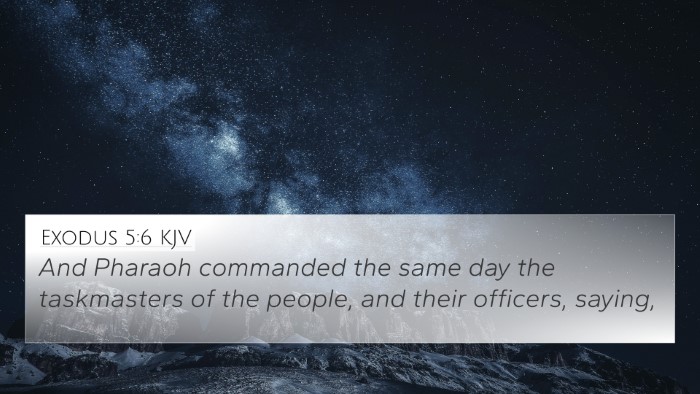
Exodus 5:6 (KJV) »
And Pharaoh commanded the same day the taskmasters of the people, and their officers, saying,
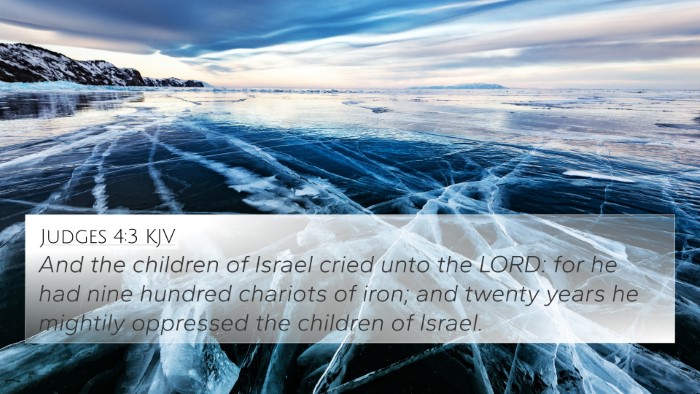
Judges 4:3 (KJV) »
And the children of Israel cried unto the LORD: for he had nine hundred chariots of iron; and twenty years he mightily oppressed the children of Israel.
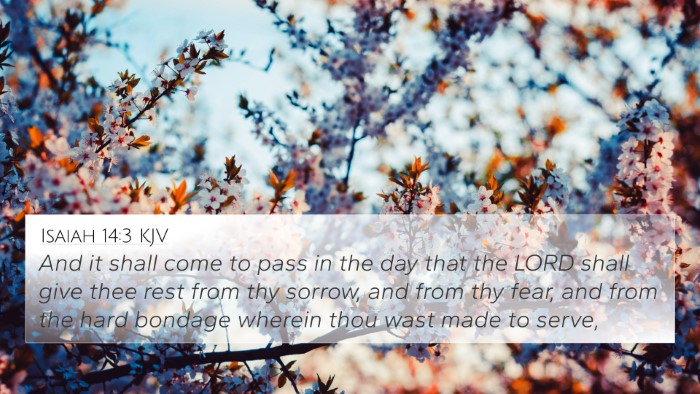
Isaiah 14:3 (KJV) »
And it shall come to pass in the day that the LORD shall give thee rest from thy sorrow, and from thy fear, and from the hard bondage wherein thou wast made to serve,
Job 3:18 Verse Analysis and Similar Verses
Understanding Job 3:18
Job 3:18 states, "There the prisoners rest together; they hear not the voice of the oppressor." This verse reflects the deep despair and hopelessness experienced by Job after losing everything he held dear. To uncover its meaning, we can draw insights from the following public domain commentaries: Matthew Henry, Albert Barnes, and Adam Clarke.
Verse Context
In the introductory chapters of the book of Job, we witness Job's immense suffering and loss. As Job contemplates his situation, he laments his birth and desires an end to his pain, expressing feelings of isolation and despair. Job 3:18 is part of this lamentation, where he imagines a state of rest for those who have suffered, highlighting both the physical and emotional toll of his circumstances.
Commentary Insights
Matthew Henry's Commentary
Matthew Henry emphasizes that Job, in his sorrow, is seeking solace in the idea that death offers rest from the turmoil of life. He notes that the "prisoners" referred to can symbolize those bound by despair, death, or affliction. Henry points out the contrast between the peace that follows death and the overwhelming oppression felt in life, suggesting that there is a certain relief in the finality of death.
Albert Barnes' Notes
Albert Barnes interprets this verse by focusing on the theme of oppression and the rest that death brings. He observes that those "in prison" (or suffering) find respite in death, where they cannot hear the afflictions of their former worldly existence. Barnes explains that Job's words indicate a longing for peace that is absent in his current sufferings, highlighting a profound existential contemplation about suffering, oppression, and mortality.
Adam Clarke's Commentary
Adam Clarke elaborates on the metaphor presented in this verse. He notes the implication of death being a kind of liberation from suffering. Clarke suggests that Job is expressing a desire for relief not only from his physical pain but also from the emotional burdens of his life. Job’s yearning for rest serves as a poignant acknowledgment of the pain of life and the perceived tranquility in death.
Thematic Connections
Job 3:18 resonates with various biblical themes and verses that explore suffering, death, and the hope of rest. Here are seven significant Bible cross-references to consider:
- Psalm 146:7-8: "Who executes justice for the oppressed; who gives food to the hungry..." – Highlighting God's concern for the oppressed.
- Ecclesiastes 3:19-20: "For what happens to the children of man happens to beasts; as one dies, so dies the other." – Reflecting on the common fate of all beings.
- Revelation 14:13: "Blessed are the dead who die in the Lord..." – Emphasizing the rest found in death for the righteous.
- Isaiah 57:2: "He enters into peace; they rest in their beds who walk in their uprightness." – The peace that follows a righteous life.
- Matthew 11:28: "Come to me, all you who are weary and burdened, and I will give you rest." – Jesus offers rest to those burdened by life.
- 2 Corinthians 5:8: "We are confident, yes, well pleased rather to be absent from the body and to be present with the Lord." – The longing to be with God in peace.
- Philippians 1:21-23: "For to me, to live is Christ, and to die is gain..." – The apostle Paul on the value of life and the peace in death.
Making Connections
This verse’s themes can be linked with others across both the Old and New Testaments, illustrating the universal struggle with suffering and the longing for peace. The use of cross-referencing Biblical texts allows readers to explore a deeper understanding of these themes.
Effective Tools for Cross-Referencing
In your study of the Bible, using a Bible concordance or a cross-reference guide can be immensely helpful. These tools enable one to:
- Identify connections between scriptures.
- Facilitate a comparative analysis of related verses.
- Explore the thematic dialogues throughout the Bible.
Cross-Referencing Study Methods
Engaging in a systematic cross-referencing approach can enrich your understanding of Scripture. Consider the following cross-referencing Bible study methods:
- Sequentially linking scripture passages related to a central theme.
- Utilizing thematic studies to draw parallels between Old and New Testament verses.
- Creating a visual series of verses that relate to a specific biblical concept.
Conclusion
Job 3:18 is a profound verse reflecting the deep grief and search for rest amidst suffering. By exploring this verse in conjunction with insights from various commentaries and related scriptures, one can gain a richer understanding of the biblical perspective on suffering, rest, and the ultimate peace found in the divine promise. Engaging with cross-references offers insights into the thematic connections that span the entire biblical narrative.
